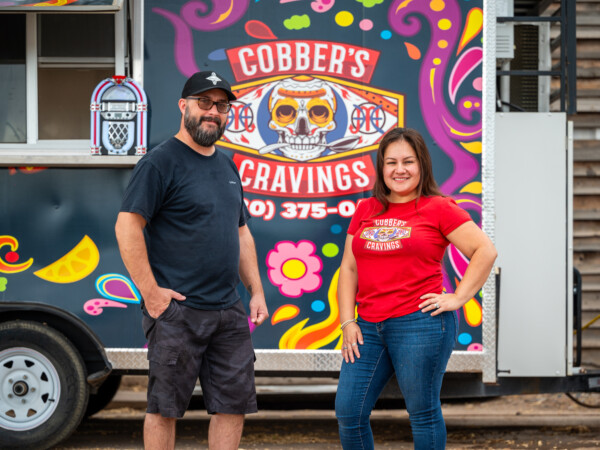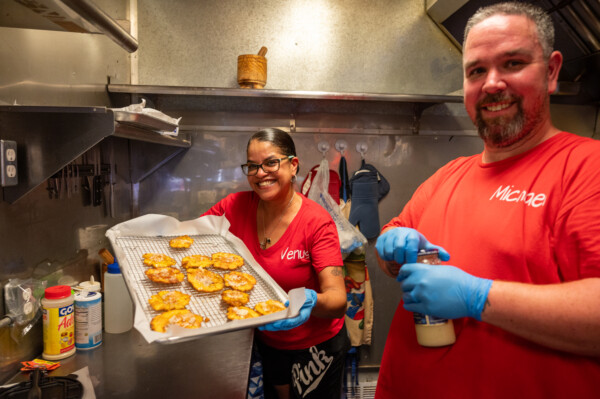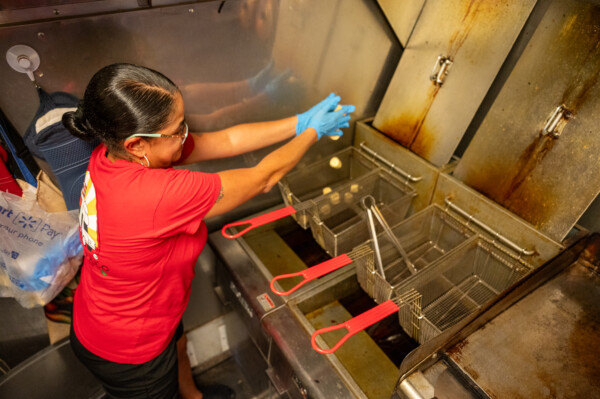
Food truck owners along John Wayne Parkway were recently given the boot. The nomadic restaurateurs aren’t sure where to go or who exactly wants them gone.
Complaints from a property owner sparked the eviction of more than a dozen food truck operators in mid-July.
From breakfast burritos to Puerto Rican empanadas, the busy Fry’s Marketplace parking lot became a sort of culinary hub. It was a central, consistent gathering place for months, owners said.
However, harmony was disrupted when a dispute with the property owner led to an abrupt eviction.
Don’t park on the parkway
The owner of the property — home to Dollar Tree, Ross, Goodwill and Planet Fitness — did not want mobile vendors on the property, citing maintenance issues and excess garbage.
The city stepped in to halt a growing mountain of trash.
“After some of these weekend events, trash cans are getting filled,” Maricopa Civilian Services Manager Wes Moss said in a July 19 email obtained by InMaricopa. “And trash is getting thrown throughout the property causing property management to pay for additional maintenance costs.”
According to the city code, food truck owners must transport trash to an authorized waste disposal site.
The unexpected move has left vendors and patrons in a state of uncertainty and disappointment.
Among the affected eateries was Cobber’s Cravings, known for its Mexican fusion flavors.
“We had no place to go,” owner Shaun Cobb said.
Cobb said his truck was stationed near the Fry’s and Goodwill parking lot since February after receiving permission from store managers there.
“It was OK with them,” Cobb said. “We weren’t going to disrupt their operations. And they were all for wanting us there.”

“We brought commerce to that shopping area,” said Michael Franz, owner of Sofrito Tan Rico. “We were driving sales there.”
Nonetheless, in mid-July, Cobb was contacted by a pair of city officials who requested written permission to operate in the parking lot.
Within half an hour, Cobb sent his proof — a makeshift contract scrawled on an orange sticky note.
City officials weren’t satisfied. The next day, they returned to the lot and demanded the trucks shut down immediately.
“They had told me that wasn’t good enough,” Cobb said. “They needed consent from the property owner. And we had to shut down right there.”
Food truck vendors admitted they weren’t well-informed when they first rolled into town. Nor did they make much effort to be.
“I think a lot of people that understood that were just kind of testing the waters to see what would happen,” Franz said. “And it just became a big thing in the parking lot where everybody was coming.”
But the experiment in camaraderie only lasted a couple of months.
Maricopa spokesperson Quinn Konold said the property owner notified the city, claiming the food trucks did not obtain permission to operate in the shopping center.
“Code enforcement officers notified the operators, and they complied by vacating the premise,” Konold said. “The city expresses its gratitude for their speedy compliance.”
An impossible task?
An uptick in roving eateries requires cities to establish rules and regulations to ensure public safety and sanitation.
Under the city’s thumb, food truck operators in Maricopa struggle to find a forever home. They face stringent permit and operational requirements.
The city code and Pinal County Environmental Health Services outline licensing requirements and mandates. Namely, food truck operators inside city limits must obtain a valid license from the Pinal County Department of Health.
Owners also need a food-service permit, similar to any brick-and-mortar restaurant in the county. The permit must remain in plain view.
Food trucks must pass annual health inspections by the county and at least one more at random, which includes reviewing food preparation, storage, water supply, disposal systems and the truck’s overall cleanliness.
InMaricopa requested food truck inspection reports, but the request was not fulfilled. County officials said the reports, which are several months old, are holed up in the Pinal County Attorney’s Office.
But even if a vendor jumps through all these hoops, the decision ultimately ends with property owners.
“Code requires all mobile vendors to have written authorization to operate on private property,” Moss said.
Written consent must be readily available at the city’s request.

The recent evictions along John Wayne Parkway are a testament to this.
Once operators have permission squared away, there are further restrictions: Walkways must be clear, parking rights are not guaranteed and occupying more than one parking space is prohibited.
Food truck merchants are also restricted from operating within 250 feet of a residential area.
Where will they go?
After a few days of scrambling and many phone calls, food truck operators were forced to find new homes.
While some shutter during the summer, others relocated to various parking lots across Maricopa.
Cobber’s Cravings is now located in front of an old water tower on North John Wayne Parkway. Cobb said his hours won’t change.
However, breakfast spots like Sario’s Cuisine won’t hit the streets again until summer’s end.

A recent, informal InMaricopa poll revealed many voters are frequent food truck patrons.
The survey of more than 300 readers found about 60% can’t live without a good serving of street food. About a quarter prefer hitting the drive-thru.
Pro-food truck respondents cited a heightened sense of community.
“Bringing Maricopa together and making small businesses a success,” self-proclaimed foodie Laurie Hayes said. “That is everything.”
She’s eager to see a comeback.
“They work hard to create authentic recipes shared to all,” Hayes said. “I would hate to see that disappear.”
Only 3% of voters claimed to “hate food trucks.”
Negative opinions centered around pricey menus and long wait times.
“The quantity and quality never seem to match the prices at food trucks,” Corry Wheeler said. “I can usually go to a restaurant for the same price, skip the lines and disappointment.”
The naysayers and evictions aren’t discouraging new players in the food truck business, however.
Local resident Patricia Hinojos announced a new food truck Aug. 12. Strawberia will dish out smoothies, açai bowls and juices — if it can find a place to park, that is. No such luck yet.
But the industry is a resilient one.
This story was first published in the September edition of InMaricopa Magazine.











![Maricopa restaurateur makes Food Network connection [Namkeen Dhaba]](https://www.inmaricopa.com/wp-content/uploads/2024/04/439456716_377105198650519_7536248579664805896_n-218x150.jpg)
![Merging lanes incite more 347 anger A merging lane sign sits on the side of State Route 347 northbound lanes during evening traffic on April 30, 2024. [Monica D. Spencer]](https://www.inmaricopa.com/wp-content/uploads/2024/04/spencer-043024-adot-merging-lanes-347-web-218x150.jpg)





There is plenty of need for food on the other side of City Hall. They would do a lot of business if they parked across the street from the library or around Walmart somewhere on this side of town.
We are always looking for more closer to us in Sorrento